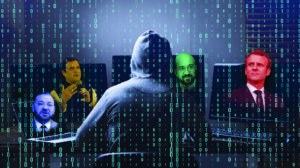Code Cracker

When I made a little wager that my new friend wouldn’t be able to hack me, I was in for the surprise of my life. But it’s comforting to know that computer whiz Alex Paskie is on the good side, helping safeguard our community from the dangers of unfiltered technology

Photos Meir Haltovsky
Watch your back!
Game on!
This is going to be fun.
I’m still navigating West Side Highway traffic when the first e-mail from Alex Paskie arrives. The challenge is on. Fun takes on an element of tension — my new friend is determined to make the point in a way that words cannot.
A day later: Oh you expected overnight? It’s got to be methodical — like I said you are on guard. Just make sure you’re okay with me taking over your identity! Bank accounts the whole shebang.
This is my fault. I asked for this challenge doubted my new friend’s claim that I am — and most of us are actually — vulnerable to being hacked. It seemed like an intriguing challenge but Alex Paskie isn’t the kind of guy you’d accept a challenge from if you aren’t okay with losing.
The office of BlueSwitch inLower Manhattan the full-service technology and web and software development company Paskie established when he was just 22 reflects the buoyancy and confidence of its young founder. There is a low hum of people at work — answering directing guiding callers. Our discussion which revolves around empowering and equipping our community with the tools to confront technology takes place in Alex’s corner office; he plays with small pieces of motherboard computer innards that cover his desk. BlueSwitch is a company built on providing solutions and as I learn sitting in his attractive office there’s no one better than Alex himself to create solutions for the problems he knows only too well.
Crumbs
In a community that treasured its wise men, Chacham Ezra Hamway was revered. Among the Jews of Halab (Aleppo), stories of his saintliness and virtue — and most notably his wisdom — are retold. One story perpetuated in several published works tells of the local Arab noble who, sitting down to his daily meal, instructed his wife to make him a Turkish coffee. She tarried. “If the coffee isn’t ready by the time I finish my kaak, you are divorced, you are divorced, you are divorced.” Sure enough, the drink arrived too late, and according to Muslim law, the marriage was terminated.
Eventually, the fellow came to his senses and he regretted the hasty pronouncement, but according to his tradition, it was binding and there seemed to be no recourse. He was advised to go to Chacham Ezra, who listened to the story.
“The kaak you were eating, it didn’t make crumbs?” asked the sage.
“Certainly it did,” replied the Arab.
“Well, then, the coffee was in fact ready before you finished the food, since you didn’t eat up those crumbs on the tablecloth and floor … and therefore the divorce isn’t valid.”
The whimsical tale illustrates a certain astuteness, an ability to look back, to deconstruct and break down a subject to the sum of its parts. Chacham Ezra passed on the talent to his progeny.
The chacham’s son, Albert Hamway, immigrated to America and launched a successful import business. His home, in the heart of the Syrian community in Flatbush, grew to include his married children — and eventually, his beloved grandson Alex Paskie.
With keen foresight, grandfather Albert understood the direction of American commerce, and he perceived that rather than retail or manufacturing, technology was the way to go. He purchased a computer for his precocious 11-year-old grandson; it was 1988, and the device was an old IBM 8086 PC/XP. Little Alex didn’t just see a large machine; he saw a world of possibilities opening before him.
No Reason for Panic
“At first, it was just the games — I loved the video games,” Paskie remembers. “But then, as I delved deeper, I began to notice little things, certain blocked-off areas that intrigued me. I remember the first game I cracked — it was called Presumed Guilty. It was a fun challenge to try to get behind the game, into the back end, so to speak, and figure out what was really going on.”
Young Alex found himself in a whole new world; before there was an Internet, he was connected. Before the term hacking had become part of the lexicon, Alex was entering the world of hackers, crackers, and phreakers. Pre World Wide Web, people were connected through bulletin board systems — and soon enough, the gifted preteen discovered a darker side, the underbelly of the bulletin board system community.
“I was just a kid. Today, everyone understands how you can get pulled in, how one thing leads to another. But back then, it all seemed so innocent, even though the stuff they were doing — stealing games and videos — was illegal.”
Eddie and Judy Paskie, for their part, were thrilled that their son was honing his computer skills. They were, of course, less happy about the astronomical phone bills incurred by dialing up to the bulletin board system. Still, no one saw a reason for panic.
Except that, in truth, there was one.
“I remember being in absolute awe of one of the first organized cracking groups. They called themselves The Humble Guys — so ironic as they were brazenly stealing games and software and cracking game protection all over.”
The group was composed of men at least ten years his senior, some of them highly competent. Still, Alex managed to work his way in — a kid in a Flatbush basement becoming friends with the big boys.
At the time, home computers were so new, no one was warning parents about the dangers lurking behind the screen. No rabbi or principal in Brooklyn was saying, “Be careful, there are hacking and cracking groups.”
The later dangers that the Internet would eventually spawn weren’t yet a problem, although there was an undercurrent of immorality, depravity, and violence to these groups.
“If I emerged relatively safe it’s because I was too young to grasp what was really going on. I was in it purely for the technological thrill — and it was thrilling, believe me.” He spreads his arms apart and laughs. “I’m a geek, okay? I enjoy the challenge, enjoy figuring this stuff out.”
We’re All Targets
An interesting sideshow to our conversation: When I wonder if the frum community is susceptible to identity theft, he laughs at the question. “Of course we are, everyone is vulnerable. I could break into your e-mail account and easily steal your identity.”
My expression makes it clear that I don’t buy his overconfident assertion, and thus is the above-mentioned challenge born. “I’m gonna get you,” he lets me know in no uncertain terms, and in the famous words of a previous president, he answers when I dare him to: “Bring ’em on.”
In the coming weeks, I will goad and taunt him, each passing day further corroboration for me of his inability to carry out his threat. C’mon, will he really be able to “get” me?
The Classic Geek
Paskie knows he can hack into just about anything, and he’s been carrying around that skill since he was a teenager. “It was kind of a secret deep inside me, though,” he breaks off and smiles impishly. “I can’t say I never used these nefarious abilities, even if it wasn’t for myself. I admit that I did help friends get out of class and figured out how to make ‘adjustments’ to their reports cards.”
How did the teachers at Magen David where he was a student react to the whiz kid?
“The computer teacher, Rabbi Hershkowitz, was great. He appreciated it when I stumped him and was a great role model. The next year he was my eighth-grade rebbi, and I learned very well under him. He was one of my early teachers who helped foster in me a real interest in Yiddishkeit.
“Then in high school I was the classic geek, as computers were starting to catch on, but there was still no awareness of the pitfalls.”
After graduation, Alex enrolled in college in addition to working full-time — the knowledge he’d amassed was in demand. But during the midway point of that year, it became clear that there was another Divine plan for young Alex, when he convinced a friend of his to come join him on a visit to their classmates learning in Eretz Yisrael.
“My friend didn’t want to come with me, but I said, ‘Come on, we’ll visit the guys, it’ll be fun.’ So he came, and he ended up staying in Eretz Yisrael while I returned to New York.”
But that friend ended up developing a real connection to learning as a result of Alex’s idea, and he didn’t forget it. “My friend finally came back two years later, and he said ‘Alex, you’ve got to start learning Gemara, you’ll love it.’”
When Alex began to learn in-depth, he was astonished to discover that the intricate rules, logic, and depth that had drawn him to programming paled in comparison to the structure of a sugya.
What’s Best for You
At that time, Alex discovered the shiurim of Rabbi Akiva Tatz and they expanded his spiritual horizons. Alex expanded his digital horizons as well; he would take the Tatz tapes and make them into MP3s — before anyone had even heard of the wonder digital players.
Then one day a friend took him along to a small kollel in Flatbush called Haim Sha’al, where the boys learned in a small group with the rosh kollel. “His name was Rav Chaim Weintraub and he became my rebbi,” says Alex. “I never met anyone like him. He was one of Rav Aharon Kotler’s prime talmidim, and here he was, this big gaon in learning, sitting at a table with a few Syrian kids, teaching us how to learn. He was so warm, so approachable and normal.”
In time, the talmidim matured in their learning. “The rebbi decided that we should go learn in Lakewood, and he arranged everything for us, a place to sleep, chavrutot, all of it. I should have been honored, but I was very hurt. I couldn’t understand why he was sending us away. Hadn’t he enjoyed learning with us?
“I was in his apartment and I asked his wife, ‘Is the rebbi unhappy with us? Why is he making us leave?’ She said, ‘Oh, Eliyahu … now you see how great my husband is. He loves learning with you boys, you bring so much energy to the kollel, but he’s forfeiting his pleasure for your good. He wants you in the place he considers best for your learning.’
“Later,” Alex reminisces, “we learned that he had paid for our arrangements in Lakewood as well, without even telling us.”
As Alex grew significantly in Yiddishkeit, evolving into a real ben Torah, his parents and grandparents looked on proudly, garnering the same encouragement they’d once displayed for his precocious computer skills.
After a period in Lakewood, Alex returned to Brooklyn, learning with his rebbi in the mornings; in the afternoon, he was hard at work at the technology company he’d established along with his friends Richard Chalme and Isaac Levy, called BlueSwitch.
He also found his bashert: Esther Paskie is the daughter Sam and Nancy Sutton, a prominent Syrian family known for their community chesed work. His father-in-law was president of Sephardic Bikur Holim and his mother-in-law founded and created the Community Cancer Center. It means the world to Alex that his rebbi, who was infirm for several years already, was able to participate in his wedding.
But his sunny features cloud over when he recalls the horrifying day of his rebbi’s passing in 2007. Rav Weintraub was killed when fire spread through his Boro Park home, just minutes after his attendant had stepped out for groceries.
I Get It
Meanwhile, the Internet was becoming a reality and BlueSwitch enjoyed great siyata d’Shmaya from the outset. The skills little Alex had honed on the old computer were proving to be valuable, even as technology raced forward.
Alex is amused just thinking about an early client. “I suggested that he allow us to take over the design and development of his Web site, but he claimed he didn’t need us, he had cheaper options. I said, ‘You have no idea what you’re doing. You don’t even realize that your site is vulnerable to hackers,’ but he said he wasn’t worried. By the time he returned to his office, I sent him an e-mail with a list of his website orders and customers, which I’d hacked from his site. He wrote back, ‘Okay, okay, I get it. You got the account.”
Yet as business expanded, so did Alex’s concern. “I began to see potential for real devastation in our community — chat rooms, indecent sights, violence, and all the rest, and I was worried. I spoke to rabbanim and askanim, but no one seemed to get what I was saying.”
Like a character in a spy novel, a lone figure who sees approaching danger in an environment of apathy, Alex carried this burdensome awareness himself because almost no one took it seriously.
“Two of the rabbanim in our community, Rav Hillel Haber and Rav Chaim Aharon Weinberg ztz”l, were ahead of the curve. About four years ago Rav Haber asked me to speak to the parents in his yeshivah, Yeshivat Shaare Torah, to give them the tools to properly understand technology, its uses and dangers. Rav Chaim Aharon Weinberg of Ateret Torah, the flagship Syrian yeshivah, was another figure in our community who sounded the alarm.”
But spiritual attacks from the Internet are often unpredictable and catch a person off guard. “In a recent speech to parents, prominent educator Rav Shmuel Dishon said that the difference between a typical hurricane and the tsunami was that the tsunami came with no warning, so there was very little by way of defense or preparedness. He said the Internet is like a tsunami that just came upon us.”
Thanks To That Kid
Then came Citi Field. Suddenly, the issue was on the table and people with a sense of communal responsibility sought to implement rules.
“My rav, the eminent posek Rav Eliezer Harari, said to me, ‘Alex, get involved, this is your thing. You should be helping people with this.’
“I remember how last summer, I was learning in the Deal Synagogue one Sunday morning and Ronnie Adjmi, a community leader, came over to me and asked me to see what could be done in our kehillah. He put me in touch with Rabbi David Churba, who was going to be running a TAG office in Flatbush [Technical Awareness Group, which assists with filters and other solutions to keep people away from Internet harm] and that was really my first acquaintance with the organization spawned by Citi Field and its goals.”
Alex’s eyes open wide as he recalls. “I was like, ‘Wow, I don’t believe it, I’ve been waiting for this all my life!’ This organization, formed specifically to equip people with solutions and guidelines for Internet use, was what I had dreamt about! TAG is more than just an advice line; they are the actual technician, ready to sit with you and your computer and make the adjustments that suit your lifestyle.”
It didn’t take long for the higher-ups at the organization to hear about the young man in Brooklyn, and they sat down together.
“When I came in, I felt like a big hotshot, like ‘there’s nothing you guys can teach me,’ but I realized very quickly that I was wrong. It’s true that my tech knowledge may have been better than theirs, but they equipped me with the clarity, vision, and practical tools to make a difference. They taught me what the people want, how to address it, the psychology and hashkafah behind what we’re doing.”
Alex quickly provided the TAG network of technicians with new and relevant information that could help them in their task of installing filters, checking devices, and empowering people in a daunting world.
The work was a bit different from what he was used to. “TAG tries to anticipate how a kid — or ‘adult’ kid — might break through a filter, while my science was more about circumventing it, disabling it completely. I have people here, in this office,” Alex points out toward the floor of BlueSwitch, “who teach me new tricks all the time, how they got through this safeguard or the other.”
Alex, who donates his time as a volunteer technician for TAG, remembers a Sunday afternoon when he was manning the Flatbush office. “A fellow came in with his smartphone, wanting a filter installed. He was a friend of mine, so I handled this particular case. The next day, he called me, irate. ‘Alex, I told you to block YouTube,’ he said, so I assured him that I had blocked the video-sharing site. ‘Yeah, then how come my son is looking at it right now?’
“I jumped in my car and headed over to his house to see, and in fact, it was true. I asked for the phone and saw that his teenage son had broken through the filter, so I asked the kid how he did it. He smiled at me and shook his head; he wasn’t telling. I called together his younger siblings and I asked, ‘Did any of you guys watch him while he was trying to break the filter?’ The kids told me what they saw, and I put together the clues. Baruch Hashem I figured out what he did and I was able to install a new filter, one he couldn’t break through.”
Alex called over the teenage expert and said, “You got me, huh?”
The kid nodded. “Yup.”
“Well not really,” Alex said, “because now, thanks to your discovery, I’m going to go back to our office and make sure that all our technicians know exactly how to install the filter the right way. You, my friend,” Alex told the teen, “have the zchus of having saved so many other Jews.”
Alex was among those who helped start a wiki for TAG, which is a repository that helps volunteers around the world share information about best practices, solutions, and specific breakthroughs.
“Ten minutes later, I was back at the office and 230 volunteers, in more than 250 locations, had that information … thanks to the kid. The beauty of TAG is that we can take existing solutions and apply them to the realities of our community, and this teenager made us aware of a new problem — and the solution.”
Sometimes though, Alex and his people have the unpleasant task of breaking bad news. “People come in with phones and computers and they ask us to check if anything inappropriate has ever been downloaded or viewed. It isn’t pleasant to have to answer that question.”
Almost Clueless
Alex sees a dichotomy in the communal response to the challenges of the Internet. “On one hand, people have really taken the issue to heart, especially after Citi Field. The TAG office is packed on Sundays. The organization has fielded over 70,000 calls and filtered over 20,000 devices since its inception.”
Yet at the same time, there is a naïveté that astonishes him. “It’s almost a cluelessness. Chazal teach us what man is capable of, how a person can fall. We have to acknowledge the nisayon: that’s the job of the yetzer hara, to persuade a person to stumble. Even a person in a satisfying marriage, with yirat Shamayim, has a yetzer hara.”
Alex finds the TAG approach refreshing. “We’re not here to be policemen, because that’s impossible. Just as locks are made for honest people, filters are made for sincere people. I remember, I once asked Reb Moshe Drew of TAG, ‘How would you filter me? I can break through all your safeguards.’ He looked at me and said, ‘Alex, I wouldn’t. That’s not the point.’ The idea is that it’s easy to slip, and the filter is just a way to make it harder to fall. Our goal is to make people’s virtual reality match their essential reality.”
Alex looks serious. Very serious. “For me, there is no real shmirah that I believe is absolute, and it’s scary. I daven that the merit of helping others should protect me. Like in all areas, it starts with realizing your potential both for failure and success, and not being blind to your own realities.
“One of the most frightening things about technology is how the Internet pushes everyone, even good people, to the wrong place. And believe me, as soon as you’re in front of a screen, you are unwittingly being pulled in, to the point that you’re nearly powerless to resist a ‘click here.’ They have your brain and instincts figured out.”
Which demographic does Alex consider most vulnerable to problems associated with computer use?
“Definitely teens and preteens. They are confident around the machines and they have free time — especially in this era of overworked parents. And it’s not just Internet use, it’s also the video games. I saw an interview with a young soldier, and the interviewer asked him what it was like to kill another man. The soldier said that it wasn’t so hard; it was just like playing an extreme-violence video game. Those virtual experiences can actually make someone immune to violence.”
Altogether, says Alex, today’s children and teenagers are growing up with different instincts than their parents, maybe even suppressing natural reactions and stunting healthy emotional responses. “When they write ‘lol’ in response to a text, they aren’t actually laughing. The emotions being conveyed aren’t real, so that teaches them that communication doesn’t have to be genuine.”
This is part of the danger of social networking sites as well, he maintains. “The idea of an online photo-sharing, video-sharing, and social networking service, for example, is the antithesis of Torah values, where people post images from every step of their lives. It has this Hollywood appeal, but it’s based on sheker. No one is always smiling, or looking perfect. It’s an image that they sell online and to anyone seeing it; it’s a violation of privacy. Chazal made halachot of yichud with a complete grasp of the human psyche — we aren’t malachim. I would advise anyone whose spouse — of whichever gender — has that type of photo-sharing account, to be wary. A person can develop an addiction to the positive attention being given by commenters seeing these carefully chosen pictures, and even the best marriage — with its consistency, good days and bad — can’t deliver that kind of rush. It’s a dangerous game.”
Logged Out
It’s a busy Erev Shabbos when I sit down by my computer. The computer seems to freeze as I open my e-mails, and I start tapping my fingers, annoyed. Nu?
Alas, I am informed that I need to reenter my password. I do, and then again. It doesn’t work. I do it slowly, no caps lock, yes caps lock, taking a deep breath between each key; nothing.
My password has been changed, I am informed, but don’t worry — I can press here if it wasn’t me who reset it. It wasn’t, and when I press, it tells me that details have been sent to my alternate e-mail. The alternate e-mail, in this case, is Alex@Tag.Org.
He won.
I call Alex and beg for mercy.
He is kind enough to share my new password with me: it’s alexgotme.
I log back in, and see his fingerprints everywhere. He has gone into my e-mails, even sent one to my editor on my behalf — and he has filled my Amazon shopping cart with titles like The Art of Intrusion, Hacking Exposed, and the like. Regards from Alex.
To be honest, I’ve kept the new password (though I realize that with this printing, I should probably change it), because I like it. It’s a good and important reminder that Alex can get me and that there are many more Alexes out there.
Technology is a dangerous game. I’m glad that Alex is on our team.
(Originally featured in Mishpacha, Issue 479)
Oops! We could not locate your form.











